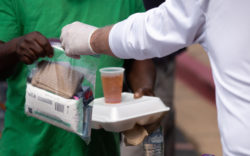Before a federal judge in Albany sentenced three former South Georgia peanut company employees to long prison sentences on Sept. 21, he listened to eight people share their stories about relatives who got seriously sick or died from salmonella hiding in snack crackers or peanut butter. The prison terms he laid down—28 years for the company owner, Stewart Parnell, and 20 years for his brother, Michael Parnell—shocked many people in the industry, but sent a message that Americans are demanding accountability for unsafe food.
Around Thanksgiving 2008, people across the country started to get deathly ill. By the time the Food and Drug Administration connected the outbreak with a peanut processing plant in Blakely, several people had died. The Centers for Disease Control and Prevention officially connected 714 illnesses, plus nine deaths, to salmonella-tainted peanuts that came from the Georgia plant, but estimate 22,000 more may have gotten sick.
In court last month, Virginia Lorentz described how she had just moved her mother into an assisted living facility to help her recover from cancer. Shirley Almer had beaten back the disease and could rebuild her strength faster with regular physical therapy. Lorentz made her mother a sandwich the day she moved in. “I was the one who fed her the peanut butter that killed her,” Lorentz said. Three years passed before she removed her mother’s number from her phone.
Gabrielle Meunier went into graphic detail about what happened to her 7-year-old son after he scarfed down packs of peanut-butter crackers during baseball practice one day. A week later, hospital staff wore protective clothing to handle little Chris Meunier, who was so contaminated, he was in reverse isolation. “There was no comfort [for him], only terror,” Meunier said.
Ernest Carter, a burly, 225-pound man with a football player’s physique, sobbed his way through describing the hospital stays that his grandmother Minnie endured as she slipped away over weeks of illness. “The salmonella had ripped her insides apart. Her organs wouldn’t function—just from eating some peanut-butter crackers,” Carter said. “My grandmother suffered the maximum penalty for eating something she loves. She died.”
These people and others waited for years to see justice and to know that the regulatory system that failed their children or parents had been fixed.
Darin Detwiler was there, but didn’t speak. Today, Detwiler works for STOP Foodborne Illness, but 22 years ago, he was a young father who lost his son to E. coli poisoning. Detwiler’s toddler son, Riley, died after he contracted deadly bacteria during the 1993 outbreak connected to the fast-food restaurant Jack in the Box. “I got emotional realizing that I had waited 22 years… not to see Stewart Parnell go to jail, not to see another family with an empty chair at the table… but to see something resolved to show that the Food Safety Modernization Act would stand up,” Detwiler said.
For years after Riley Detwiler and three other children died from E. coli introduced by Jack in the Box hamburgers, regulators approached food safety as a meat issue, Detwiler said. But beginning in 2006, a series of outbreaks involving produce—organically grown spinach, green onions and lettuce—showed that meat wasn’t the only danger. The outbreak of salmonella poisoning from a peanut plant—where inspectors documented rodents and a leaky roof—was the straw that broke the camel’s back.
A bipartisan group of legislators passed the FSMA, the first major overhaul of the American food system in 100 years. The law requires new rules for the safe handling of produce and sets standards for how food is grown overseas, among other things. It’s a big step in the right direction, but not the silver bullet to fix everything wrong with our food system, Detwiler said later.
The U.S. still has a long way to go. Unlike some other countries, the U.S. has 15 different agencies that play some role in food safety. The division of responsibility between the FDA and U.S. Department of Agriculture can seem ridiculous at times. According to Detwiler, eggs in the shell are regulated by one agency, but eggs out of the shell by the other. Frozen pizza with meat toppings answers to one agency, while cheese-only pizza to the other. And for all its ground-breaking, FSMA hasn’t been put into practice yet. Seven major rules aren’t finished. The earliest will first be applied next year.
Still, the case in Georgia drew attention to food safety in a new way, and the sentence showed a change in attitude. When Colorado brothers Eric and Ryan Jensen were charged with shipping Listeria-contaminated cantaloupe that killed 33 people in 2011, they got five years’ probation. When father and son Jack and Peter DeCoster were charged with making 2,000 people sick in 2010 through salmonella-tainted eggs, they were sentenced to three months in jail.
“It’s a big difference between a few months and 28 years… The shock and denial coming from the [defense] side of the room was palpable,” Detwiler said. “They honestly thought they were going to get a few months in prison. But if that had happened, you might as well have wadded up FSMA and thrown it in the trash. It wouldn’t have been worth the paper it was printed on.”
The Parnells will appeal.
Like what you just read? Support Flagpole by making a donation today. Every dollar you give helps fund our ongoing mission to provide Athens with quality, independent journalism.










